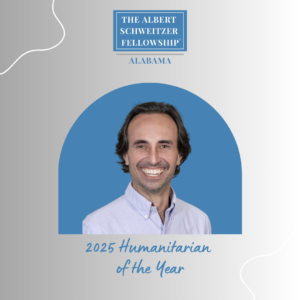Fellow for Life Dr. Stefan Kertesz (Lambaréné 1992) has spent much of his medical career treating homeless people. He is a strong proponent of the Housing First approach to eradicating homelessness, a harm reduction strategy that prioritizes getting homeless people into permanent housing as quickly as possible, without pre-conditions such as mandatory substance abuse or mental health treatment. Instead, individuals in Housing First programs “rapidly rehoused” and simultaneously offered an array of supportive services like case management, mental health treatment, or substance abuse intervention and can choose which, if any, they’ll participate in.
This approach has seen measurable success in cities across the U.S. So much, in fact, that last month, Gov. Jerry Brown signed legislation mandating a Housing First strategy to attack homelessness in California. It has also been adopted in cities in Canada, Finland, France, and Japan. Kertesz calls it a “crucial tool right now to move forward in helping people escape from a devastating situation we were not addressing satisfactorily before.”
In July, Kertesz, who chairs our Alabama Chapter, gave two talks on Housing First in Melbourne, Australia, at the invitation of the Melbourne Institute at Melbourne University and the Royal Melbourne Institute of Technology. Titled “Housing First: A Case of Overreaching,” the presentations cautioned Housing First advocates against overselling the cost effectiveness or improved health outcomes of such an approach, as data definitively showing dramatic improvement in these areas remain elusive. He suggested that Housing First supporters must reframe their arguments to emphasize that the successfully housing chronically homeless people on a permanent basis is an ethical, valuable goal in itself.
In the same vein, Kertesz said that there can be no cutting corners on the complicated process of implementing Housing First programs.
Drawing on his own work implementing a Housing First program for veterans (Kertesz is a doctor at the Birmingham VA Medical Center), he points out that successfully getting homeless people into permanent housing―and keeping them there―requires a great deal of formal cross-agency and community collaboration, open channels of communication across all levels of organizational staff, management, and executive leadership, and a willingness to invest financial resources upfront to ensure later success.
“Most things that we try to do that are good,” said Kertesz, “we have to spend a little extra to do the good thing.”
Kertesz’s dedication to working with homeless individuals was inspired by his work as a Schweitzer Fellow. He drew on his professional experiences to encourage ordinary people to do what they can to help others in distress in an excellent TEDx Birmingham talk called “We Don’t Need to Be Heroes to Be Helpful” in January 2015.



